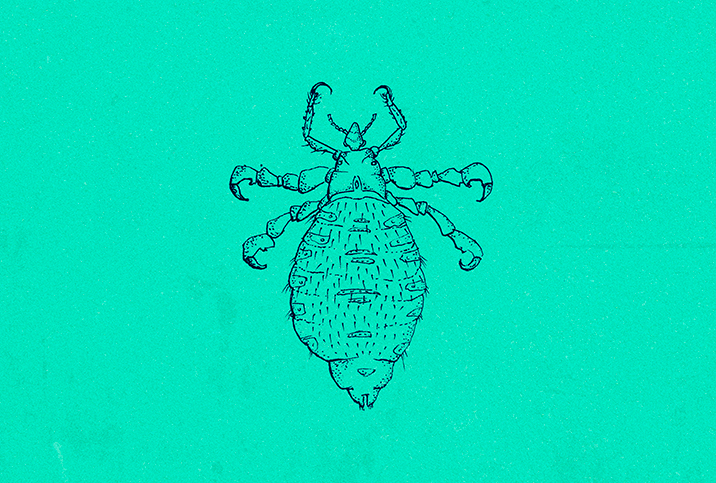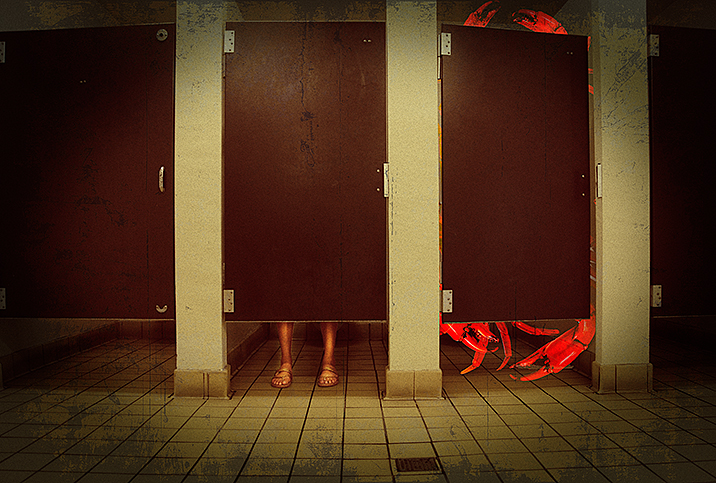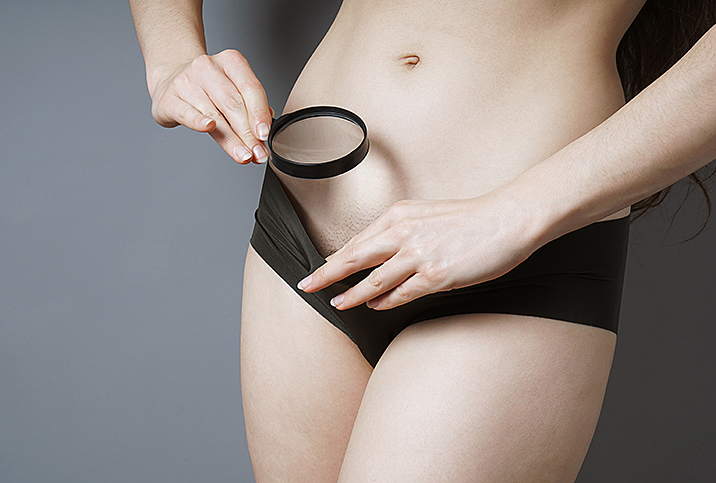A Closer Look at Crabs and (Almost) Every Way to Get Rid of Them

Chances are you've heard of crabs, but you wouldn't be alone in wondering what they actually are—surely, they're not literal crabs. You're right; they're not. Crabs is another term for pubic lice, which uncomfortably resemble the seashore creature when examined under a microscope.
Pubic lice are tiny parasites typically transmitted through close physical contact, usually involving a sexual partner, according to Lynn Barclay, sexual health expert and medical advisor at the Body Agency, a sexual wellness company based in Maryland. It's hard to estimate how common crabs are because they're not reported as if they were a sexually transmitted infection (STI).
"Crabs is not a reportable condition, and it's hard to be precise," Barclay said. "Some data estimate global incidences among adults of 1 to 2 percent."
According to Planned Parenthood, about 3 million people get pubic lice in the United States every year, although Barclay noted the trend of removing pubic hair might drive these numbers down. Unfortunately, removing pubic hair doesn't necessarily fix the problem.
"It's important to remember that shaving off the infected areas of hair or taking a hot bath won't actually kill off the lice," explained Emily Fata, CEO and founder of Between Our Thighs, a sex-positive website based in Toronto.
Crabs can be an easy catch
Pubic lice are highly contagious: If your partner has them, you have a 95 percent chance of getting them, too.
"Crabs are commonly spread through sexual activities and are spread through the genitals," Fata said. "The crab-like creatures typically cling to coarse hair and can migrate from one partner's pubic hair to the other, regardless of whether penetration occurs or not."
For many years, urban legends persisted that a particularly dirty public bathroom could harbor pubic lice, but Barclay said, in fact, toilets and restrooms pose little or no risk.
"In rarer cases, they can potentially be passed along from one person to the next by sharing infested sheets or blankets, clothing and towels," Fata noted. "They're different from the lice one might find in the hair on their head or the rest of the body."
Getting crabs from bedding and towels in hotels and public washrooms is unlikely because lice live only for a maximum of approximately 48 hours without human blood. However, lice can be passed around via this method easily in families and at hostels, military bases and other places where large groups of people live in a small space.
Symptoms and treatment
The most obvious symptom of pubic lice is—you guessed it—itching.
"You might also see the lice themselves or even their eggs—whitish in color and called nits—but they're pretty small and can be hard to detect," Barclay said.
Other body parts that grow coarse hair, such as the armpits, might become itchy. The lice can also spread to the eyebrows or lashes, although this is more commonly found in children.
"Finding trace amounts of blood in your underwear, pale blue specks on the lower abdomen [or] around the buttocks, and the potential of a low-grade fever are additional symptoms to keep an eye out for," Fata said.
If you have crabs, don't panic.
"The good news is that pubic lice are treatable," Fata said. "Treatments are accessible at your local pharmacy."
"There are over-the-counter medications for lice that come in the form of a cream with permethrin or a shampoo containing pyrethrins and piperonyl butoxide," Barclay recommended. Brand names include Nix and Rid.
"These are safe and effective, but follow directions closely and don't feel shy about asking a pharmacist if you have questions," she added.
Fata noted the products often have to be left on for a particular amount of time.
"This varies based on the specific brand's instructions, so be sure to read this thoroughly before applying," she explained.
What works and what doesn't
The Centers for Disease Control and Prevention (CDC) specifically recommends a 1 percent permethrin lotion or a mousse containing pyrethrins and piperonyl butoxide to kill pubic lice. But it's important to know these treatments should not be used for lice around eyelashes or eyebrows.
"In some cases, this does not work, and I would recommend consulting your doctor," Fata said. "If you're pregnant or have abrasions [or] cuts in the skin from excessive scratching, it's also advisable to reach out to a medical practitioner, whether you have attempted an at-home treatment yet or not. In some cases, crabs can lead to secondary infections, so be mindful."
If you do visit your doctor, they might prescribe a shampoo with the active ingredient lindane.
"It can be toxic and is most often used when other treatments have failed," Barclay noted.
The CDC warns that shampoo products containing lindane should be the last line of treatment because lindane can be toxic to both the brain and nervous system. Children, older adults, people who weigh less than 110 pounds and anyone with a seizure disorder should avoid using lindane-based shampoo.
For people looking to avoid medications altogether, lice can be picked out one by one, though this requires thorough attention to detail.
"Folks can also remove the individual nits from each strand of pubic hair with a fine-toothed comb, similar to what one might use to remove head lice," Fata said.
How to avoid crabs altogether
Beyond treating the lice on your body, it's important to think about where they may have come from and whether they spread.
"A hot, disinfectant wash is highly recommended for all clothing and bedding to ensure that all lice and eggs are killed and won't threaten a new infestation," Fata advised. "The best method of preventing an infestation of pubic lice is to avoid sexual contact of any kind with someone who currently has crabs. As well, avoid sharing any clothing or bedding until they have been treated and are in the clear."
People who are diagnosed and undergoing treatment for pubic lice should inform anyone with whom they have had sexual contact or share living space.
"Make sure any recent sex partners are treated, too, otherwise, you'll acquire crabs again," Barclay said.

















